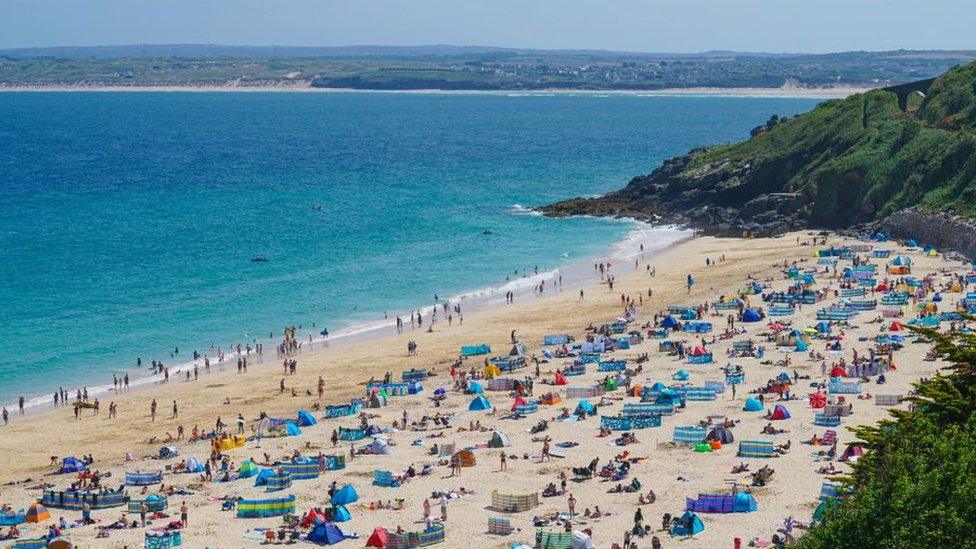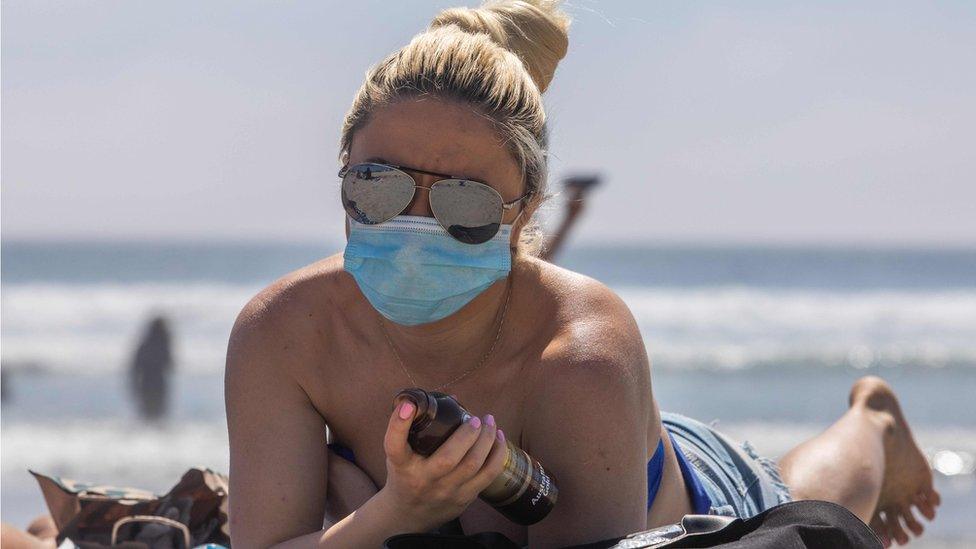Covid: Boris Johnson 'optimistic' about summer holiday prospects
- Published
- comments

Last summer people flocked to Cornwall to enjoy the summer weather
Prime Minister Boris Johnson says he is "optimistic" people will be able to have summer holidays this year - but it depends on certain things going well.
Asked about tourism in the UK, he said he did not want to give "concrete" dates for such trips but would set out more details on 22 February.
The success of the vaccine rollout and level of Covid cases would be factors taken into consideration, he added.
Nearly 9.3 million people in the UK , externalhave had their first dose of a vaccine.
A vaccine has been offered to all older residents at eligible care homes in England, the NHS announced earlier - an achievement Mr Johnson described as a "crucial milestone".
The government is aiming to offer all care home residents and carers, people over 70 and frontline care workers a vaccination by mid-February.
Figures released on Monday show a further 18,607 Covid cases have been recorded. There have also been a further 406 deaths within 28 days of a positive test.
Mr Johnson, speaking during a visit to Batley, West Yorkshire, said: "I don't want to give too much concrete by way of dates for our summer holidays. I am optimistic - I understand the reasons for being optimistic - but some things have got to go right.
"The vaccine programme has got to continue to be successful.
"We have got to make sure we don't get thrown off course by new variants, we have got to make sure that we continue to keep the disease under control and the level of infections come down."
He added that once he gives more details in the last week of February "people should certainly be able to plan on that basis".
His comments come after Health Secretary Matt Hancock predicted "a happy and free Great British summer".
Meanwhile, the government has announced it is to carry out urgent door-to-door testing in parts of England for a new variant of coronavirus originally identified in South Africa, after cases were found with no known links to travel or previous cases.
All of the UK is currently under a lockdown, with people only allowed to travel abroad for essential purposes; such as work that cannot be done from home, medical appointments or educational reasons. These are the same "reasonable excuses" that apply to domestic travel.
Mr Johnson said there were signs the lockdown measures were working but it was too early to "take your foot off the throat of the beast" by easing restrictions.
"We are starting to see some signs of a flattening and maybe even a falling off of infection rates and hospitalisations," he said.
"But don't forget that they are still at a very high level by comparison with most points in the last 12 months, a really very high level."


Rules around international travel were tightened last month, meaning all travellers must self-isolate for 10 days when they return to the UK, while people returning to England from high-risk countries will have to quarantine in government-provided hotels.
People leaving England will soon have to make a declaration on why they need to travel, which will be checked by carriers prior to departure, Home Secretary Priti Patel has announced.
Some UK holiday providers have since reported a boom in domestic bookings for this summer.
The boss of Ryanair, Michael O'Leary, said he is expecting "a strong return" for European beach holidays this summer thanks to the vaccination programme.

TESTING: How do I get a virus test?
LOOK-UP TOOL: How many cases in your area?
GLOBAL SPREAD: How many worldwide cases are there?

Dr Mike Tildesley, an infectious disease expert who advises the government, suggested that if the UK continued the current pace of vaccinations - and jabs were shown to prevent transmission, not just severe infection - measures could begin to be eased from March.
"We need to be very careful," he told BBC Radio 4's Today programme . "Hopefully by the summer we can get back to something pretty close to what we have seen before the pandemic as normal."
Vaccines would need to be "pretty good" at blocking transmission "to avoid a resurgence" of the virus when measures are eased, Dr Tildesley added, with research due on this over the next month.
The UK government announced on Monday that it had ordered an extra 40 million doses of a vaccine from the French pharmaceutical company Valneva, that should become available later in the year and into 2022.
That takes the total number of different vaccines the UK has secured to 407 million doses - more than enough for the entire population.
However, the prime minister's official spokesman said it was too soon to say when "surplus" vaccine doses could be donated to other counties, such as European Union member states.
He said the priority remained getting the vaccine to the most vulnerable in society by the spring.

LOCKDOWN LEARNING: Need some assistance with home-schooling? BBC iPlayer is here to help
TASTY TIME-WASTING: How are food businesses helping us beat lockdown boredom?

In other developments:
Austrian police have placed 96 foreigners, including Britons, into mandatory quarantine after they were caught breaching Covid-19 restrictions by taking a skiing holiday
Social distancing rules on the Isle of Man have been scrapped by the government after a 25-day lockdown and the island recording 20 days without an unexplained community case
Related topics
- Published11 February 2022

- Published28 January 2021
